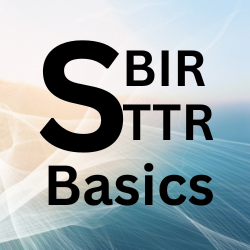Navigating Liability in Grant Writing
Who Bears the Liability for False Statements?
Securing grant funding can be a game-changer for small businesses, particularly in programs like the Small Business Innovation Research (SBIR) and Small Business Technology Transfer (STTR) initiatives. These government-backed programs provide critical financial resources for research and development, allowing entrepreneurs to innovate, grow, and advance their technologies. However, while grant writing is an essential step toward obtaining this funding, it can also be fraught with risks—especially regarding the accuracy of the statements and the proposed budgets in the application.
Small business owners face a more perplexing question: Who holds liability when false statements or overstated budgets appear in a grant proposal? Is it the grant writer who crafted the proposal, or is it the business that submitted it? This article will explore this critical issue, breaking down the potential liabilities and best practices for enterprises working with grant writers.
The Role of the Grant Writer: Assistance, Not Ownership
You hire grant writers to provide expertise and guidance in preparing proposals that align with the specific requirements of funding programs like SBIR and STTR. They often:
-
- Assist in shaping the narrative of the application,
- Ensure that the proposal is coherent, persuasive, and
- Comply with the proposal guidelines set by the funding agency.
However, despite their invaluable help, grant writers do not hold the final responsibility for the proposal’s content—that falls squarely on the shoulders of the business submitting the grant.
Grant writers are essentially consultants or contractors who help prepare the application documents. While they may advise on budget allocations, labor rates, and the project’s overall scope, the business is ultimately accountable for the truthfulness and accuracy of the entire proposal, including all statements, financial figures, and projections.
Who Bears the Liability for False Statements?
Under the False Claims Act and other federal rules, businesses—not grant writers—are liable for false or misleading information in submissions, whether intentional or not. This includes inflated budgets, overstated labor costs, or unsupported claims about key personnel. If a business submits a proposal that contains false statements or misleading information, the company—and not the grant writer—bears full responsibility for the consequences, which can include:
- Fines and penalties: False claims can result in significant fines, ranging from several thousand dollars to millions, depending on the severity of the violation.
- Criminal prosecution: In some cases, prosecutors may file criminal charges against individuals within the company, especially when they intentionally make false statements.
- Rejection of the proposal: If discrepancies or misrepresentations exist, the government may deny funding or request the return of any disbursed funds.
Real-World Liability Example
Several companies I’ve worked with ran into this issue. A grant writer advised using the NIH 2023 salary cap of $203,700 for key personnel. However, the CEO was unpaid and not a W-2 employee, and the PI earned $120,000—not $203,700. By overstating labor rates, the company—not the grant writer—had to repay funds, lost a pending award, and now faces legal consequences.
Note: You can plan for higher future salaries, but rates must be reasonable and reflect what the company truly expects to pay. For example, if your CEO will earn $200,000 and work 20% on the project, the company must pay the full $200,000—not just the grant-covered 20%—to charge that amount appropriately.
Misleading Budgets: A Common Pitfall
The budget is one of the more frequent areas where small businesses and grant writers clash. When preparing an SBIR or STTR proposal, the budget is not just a financial document but an essential part of the project’s narrative. The proposed budget provides the funding agency insight into how the business plans to allocate resources, manage costs, and execute the proposed research.
However, as in the example above, there may be a temptation to inflate certain budget items. In addition to overstating labor rates, a company may also:
-
- Overstate labor hours needed
- Include non-project-related costs
- Include costs already in another project
- Include indirect cost items as direct cost items
- Overstate other direct costs.
Grant writers may suggest amounts or organize the budget, but the business must ensure figures are accurate and justified. Writers often lack insight into actual costs, internal operations, or federal cost rules. They may not understand that padding the budget or adding contingencies is unallowable. Ultimately, the business must provide truthful estimates—if it inflates costs or misrepresents needs, it holds the liability, not the grant writer.
Legal Responsibility: It’s in the Fine Print
Many businesses assume that by hiring an experienced grant writer or consultant, they shift liability for any inaccuracies in the proposal. Unfortunately, this is not the case. Even if a grant writer was negligent in advising on the budget or drafting a proposal, the final responsibility falls on the business that applies. This principle holds even if the grant writer and business sign a contract that outlines the grant writer’s responsibilities.
If a business hires a grant writer, it should ensure that the contract includes clear language about responsibility for the proposal’s content. Companies must understand that they are still the ultimate authority on the proposal’s accuracy, including the budget.
Here are a few critical points to consider when contracting with a grant writer. These items don’t relieve the company of responsibility to the government, but may provide recourse for recovery of legal and other costs from the grant writer.
-
- Indemnification Clauses: Some businesses may include indemnification clauses in contracts with grant writers, which could provide some protection in the event of a dispute or legal claim. However, this would typically only apply if the grant writer’s negligence led to the issue, and the business still needs to prove that negligence in court.
- Due Diligence: Businesses should actively participate in the grant-writing process. Reviewing the proposal, including the budget and any claims made, is essential. It’s not enough to delegate the task and trust that the grant writer covers everything.
- Communication: Clear communication with the grant writer is critical. The business should ensure that the writer fully understands the scope of the project and the realistic budget based on the actual costs of doing business. Providing comprehensive project details and working closely with the grant writer will help minimize errors.
Best Practices for Businesses Working with Grant Writers
To avoid the pitfalls of false statements, misleading budgets, and potential liability, small businesses should take the following steps when working with grant writers:
-
- Get Expert Advice: If you don’t understand accounting, budgets, or the specifics of SBIR and STTR program requirements and lack the skills to evaluate grant writers or the proposals they generate, hire a compliance specialist who cannot only facilitate proposal development but also assist you in ensuring proposal accuracy.
- Choose Experienced Writers: Work with grant writers with a track record of successful proposals and a deep understanding of SBIR and STTR requirements. An experienced grant writer can ensure the proposal is competitive and compliant.
- Collaborate Closely: Grant writing should not be a “set it and forget it” process. Businesses should maintain an active role in creating the proposal, ensuring they are involved in discussions about the budget, labor rates, and other critical details.
- Double-check the Numbers: Before submitting the proposal, businesses should verify the accuracy of the budget, labor rates, and other financial aspects. The company must resolve any issues before submission.
- Maintain Transparency: If the business anticipates any challenges in meeting the grant’s financial or project requirements, it’s best to address them openly. Communication with the funding agency may be necessary if the project scope or budget changes during the proposal or the project.
Conclusion: Accountability Starts at the Top
While grant writers play an important role in crafting compelling proposals, the ultimate responsibility for the accuracy of the application—including any statements, representations, and budgetary figures—rests with the business. Companies seeking SBIR or STTR funding must understand that false statements or overstated budgets can lead to significant legal, financial, and reputational damage. Therefore, businesses must remain actively involved in the process, ensuring that the proposals submitted to federal agencies are truthful, transparent, and compliant with all regulations.
By maintaining open communication with grant writers, staying engaged in the proposal process, and verifying all aspects of the proposal, small businesses can reduce the risk of liability and position themselves for success in the competitive world of federal funding.
References:
- U.S. Small Business Administration (SBA). (2021). SBIR/STTR Policies and Guidelines. Retrieved from https://sbir.gov
- U.S. Department of Justice. (2020). False Claims Act. Retrieved from https://www.justice.gov/civil/false-claims-act

